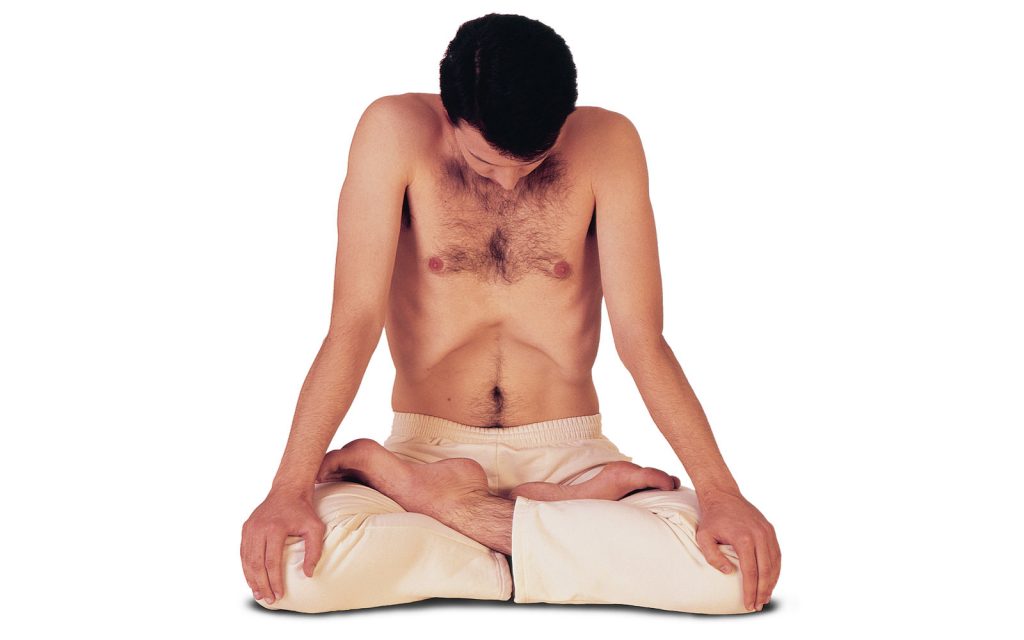
Yoga philosophy is founded upon meditation, asana and joy. These practices are intended for the improvement of one's physical condition. If they can last for a long time, the asanas will be considered mastery. There are four types, including Primary, Intermediate and Advanced. To be successful in each asana, you need to have a certain level of mental concentration. The main goal is to stabilise the breath and remove any distractions.
There are several stages in yoga. The first five stages are external aids. The final three stages are mental aids. Dharana means the ability to remain conscious of the externals over a long period of time. Dhyana is the unabated contemplation and concentration on the object of meditation, without the need to think about the ego. The ultimate goal in all yoga practices is samadhi. This refers to total self-collectedness. The meditator can achieve this state by connecting to the cosmic intelligence.
Yoga's intellectual content is made up of principles of Samkhya which are the Hindu school and philosophy. It assumes the existence of a Supreme Being. The aspirant will be able to attain total spiritual freedom. Aspirants should be free from all forms of ignorance, illusion and matter. They can only succeed in the end. Through dephenomenalization, the aspirant attempts to revert the order of the world and achieve a state of purity.

The core principles of yoga philosophy can be difficult for a Westerner to understand. The core concepts can be helpful in reorienting your mind and experiencing the interconnectedness of all things. Yoga practice includes different aspects of the subtle body such as chakras, nadis and spiritual chi. Hatha yoga focuses on energy anatomy and is an integral part yoga practice.
If you are serious about your practice of yoga, it is important to understand the philosophy behind yoga. It is about preparing the body and mind to practice yoga. In the first two stages, the Yoga Sutras focus on ethical preparations and ethical considerations. The yama, niyama and final stages of yoga are the first. The niyama stages focus on discipline and abstinence, while the niyama stages focus on the mind.
The eight limbs of yoga are described in the Yoga Sutra's aphorisms, also known as "Threads of Wisdom". These aphorisms offer guidelines for living a meaningful and fulfilling life. The Sutra not only discusses the eight limbs and aspects of yoga but also the diverse aspects of meditation. It stresses the importance of mindfulness and meditation. It encourages people to reach their full potential. It is a great way to avoid suffering.
Yoga philosophy emphasizes moksha, which is more than asanas. Yoga practice should include the following aphorisms. The fundamental aspect of yoga practice is the asanas. The asanas may help practitioners attain moksha. It is important to know the philosophical roots of this practice. You can start with the yogic texts. You should incorporate the principles of the Aphorisms into your Yoga practice if you want to be serious about it.

Self-realization has been a central concept of yoga philosophy. This is achieved through the practice and teaching of the Yoga-sutras (also called the Yoga Sutras). There are many principles and practices in the sutras that will help you to realize your true self. In addition to asanas, the Yoga-sutras are the main texts of yoga. During Asanas, practitioners should pay attention to their breath.
The ultimate goal of yoga is the sustained experience of pure awareness, also known as Samadhi or Moksha. A yoga practitioner can experience this as the realization of their "true selves". The mind, body and mental constructs are all gone and all that is left is the present moment. To attain this enlightened state, you must study the yoga philosophy. This is an integral part to the practice.
Yoga asanas can be a vital part of the practice. But there are also other benefits. These practices can help you relax and improve your energy level. They improve the immune system which is an important part of the human body. Before performing asanas, it is crucial to understand yoga philosophy and its benefits. The EkhartYoga Academy offers a course titled The Yoga Sutras of Patanjali.
FAQ
Which exercise is best for men
The answer depends on what you are looking for. If you want to lose weight, cardio workouts are great because they burn calories faster than strength training exercises.
On the other hand, if you just want to build muscle mass, then strength training is better since it increases lean body mass.
Both types of exercise are proven to be beneficial if you're looking to improve your overall health.
If you are looking to lose weight quickly, I recommend HIIT or sprint-interval training. This type of training helps you burn fat quickly by increasing your metabolism. It also boosts your endurance to continue training even when you feel tired.
Egg is good for you?
The egg is rich in all nutrients needed by the human body. It helps to maintain strong bones and healthy hearts and lungs and stabilize blood pressure.
Eggs are a good source of protein and vitamins A, B12, D, E K, calcium, phosphorus iron, zinc copper, magnesium selenium and even riboflavin.
The cholesterol content of egg yolks is high. However, it does not contain saturated fat. Eggs are lower in saturated fat than other foods.
They are also low in calories and sodium. You can make them in any way you like. You can fry, poach, scramble, boil, hard-boil, and bake them.
They are delicious and very easy to prepare.
Each day, you should consume at least 2 whole eggs. If you dislike eating eggs, you should add them to your diet.
Eggs are a good source of essential nutrients for our bodies. Consider adding eggs to your daily meal plan today.
What if I exercise and drink alcohol?
Yes. Alcohol can increase energy expenditure, speed recovery time, and reduce soreness.
Alcohol also increases insulin sensitivity, making it easier to absorb glucose.
Dehydration can result from alcohol, which can affect your metabolism. It also reduces testosterone production, which may decrease muscle-building potential.
For these reasons, women shouldn't drink alcoholic beverages before working out. Women who have consumed a lot of alcohol should wait at most 24 hours before working out.
The best thing for women who are pregnant is to avoid alcohol.
Men should limit their alcohol intake to just one drink each day.
Statistics
- 10 pounds in a month is likely during a lean bulking phase, especially for beginners. (muscleandstrength.com)
- The PRS enabled risk stratification for overall prostate cancer and lethal disease with a four-fold difference between men in the highest and lowest quartiles (HR, 4.32; 95% confidence interval [CI], 3.16-5.89). (pubmed.ncbi.nlm.nih.gov)
- Are You One of the 20% of Guys (mh.co.za)
- An estimated calorie range for moderately active adult males falls between 2,200 to 2,800 calories per day, depending on age. (eatright.org)
- Cardmembers earn 5% Back at Amazon.com with a Prime Credit Card. (amazon.com)
External Links
How To
What nutrients do men need each day?
For healthy growth and development, men need to eat a balanced diet. Your body needs vitamins, minerals and nutrients as well as carbohydrates, proteins, fats, carbohydrate, fiber, and other essential components.
Also, the male body requires certain nutrients at specific times during the day. You can see that your body uses energy to make hormones. When you get up, protein is used to repair and build muscle.
Your body will burn fat at night and store the extra energy as a form of glycogen. During this time, your body needs fewer calories but still needs sufficient nutrients. You can have a snack at night if you feel hungry.
Working out requires adequate carbohydrate and protein intake. If you train hard, you may experience muscle soreness after exercising.
To avoid this, you need to eat carbs and proteins within two hours of training. Your body will breakdown stored glycogen and provide you with glucose for energy.
Also, protein must be consumed immediately after your workouts. This prevents muscle tissue from being broken down while you are sleeping.
Lactic acid is produced by the body during periods of intense exercise. Your body can build up lactic acid in the bloodstream which causes fatigue. Avoid this by eating foods rich in carbohydrates such as fruits or vegetables.
Carbohydrates are a good source of energy to help you recover from hard exercise.
Your diet may include lean meats like fish, eggs, milk cheese, yogurt or beans as well as lean proteins such as fish, eggs, egg yolks, cheese, yogurt, bean, peanuts and seeds.
These foods all contain high-quality proteins. Protein promotes muscle growth and repairs damaged tissues. It also provides the amino acids your body needs to produce sex hormones and testosterone.
You also need enough dietary fats to maintain good skin, hair, nails, and joints. Healthy men should consume between 20% to 35% of their daily caloric intake from fat.
Fat protects your heart from cancer and keeps it strong. It keeps your brain healthy and functioning well.
You can get the majority of the fats that you need from vegetable oils such as soybean oil.
These oils are high in monounsaturated fatty acids (MUFAs). MUFAs are good for lowering cholesterol and reducing inflammation. They also protect your cells from damage caused by free radicals.
Saturated fats are found in animal products including meat, dairy products, butter and other dairy products. SFAs can raise LDL ("bad") cholesterol levels and increase triglycerides. They also promote weight gain and belly fat.
Polyunsaturated fats (PUFAs) are found in plant-based sources like vegetable oils, nuts, seeds, and grains. PUFAs help improve cardiovascular function, and lower inflammation. They also reduce blood sugar, cholesterol, and other inflammatory factors.
Erectile dysfunction is common in men with low HDL ("good") cholesterol. Consuming high amounts of saturated fats can increase bad cholesterol and lower good cholesterol.
Red meat and pork are a common source of prostate problems in men who eat a lot. When cooked at high temperatures, nitrates can be converted to nitrosamines. These compounds can lead to cancer.
Most processed meats have nitrites and harmful chemicals. Avoid them completely.
The American Heart Association recommends eating no more than 2 servings of red meat per week. Instead, choose poultry and fish, legumes, tofu or whole grain bread as your main source of protein.